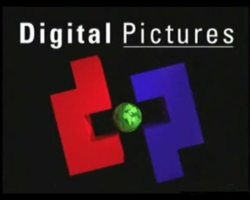- Digital Pictures
-
For digital pictures in the common sense, see Digital photography.
Digital Pictures 
Company logoIndustry Video games Founded 1991 Founder(s) Ken Melville, Tom Zito Headquarters Menlo Park, California[1], United States Digital Pictures was a worldwide American video game developer, founded in 1991 by Ken Melville and Tom Zito.[1]
On the Sega CD versions of certain games, if they are played on the systems "audio CD" mode, there is a short track of a phone ringing with a male voice answering "Good afternoon, Digital Pictures", followed by a backwards playback of several voices saying "number nine" ("enin rebmun"), a reference to The Beatles song Revolution 9. The message is a hint for Sewer Shark; if the player turns left (referred to as "niner" in the game) three times the player will not hit a wall.
Contents
Full motion video games
In the 1980s the company designed the video game, Scene Of The Crime for Hasbro's NEMO video game system that used VHS tapes rather than cartridges, which allowed the game to offer live action and interactive full motion video. While NEMO was not successful, Digital Pictures would later convert this game in 1992 for Sega's new Mega CD home console system under the new name; Night Trap.
Throughout the 1990s, Digital Pictures continued to design interactive full motion video games for the CD-ROM format. Several popular actors, including Mark Wahlberg, Steve Eastin, Corey Haim and Dana Plato, appeared in Digital Pictures games.
Controversy
In the early 1990s, Night Trap was singled out by numerous interest groups and by Senators Joseph Lieberman and Herbert Kohl as evidence that the video game industry was marketing games with graphic violence and other adult content to minors. Concern about Night Trap and several other games such as Midway's Mortal Kombat, Konami's Lethal Enforcers, and id Software's Doom helped to bring about the creation of the ESRB video game rating system.
Decline
By the late 1990s, consumer interest in full-motion video games, which accounted for the majority of the company's profits, was in decline. After the collapse of the company, its assets were acquired by Cyber Cinema Interactive. The new company intended to re-release the games for DVD but that never came about. The only actual production for Cyber Cinema was the direct to video film Game Over - also known as Maximum Surge Movie. This used footage from an unreleased video game called Maximum Surge as well as brief clips from other Digital Pictures games. Although the film boasted stars such as Yasmine Bleeth and Walter Koenig, they actually only appeared in the segments that had been pulled from the FMV sequences of the game, which themselves were easily spotted due to their varying image quality.
Games developed
- 3DO
- Mega-CD
- Corpse Killer
- Double Switch
- Ground Zero: Texas
- INXS: Make My Video
- Kids on Site
- Kris Kross: Make My Video
- Marky Mark: Make My Video
- Night Trap
- Power Factory Featuring C+C Music Factory
- Prize Fighter
- Sewer Shark
- Slam City With Scottie Pippen
- Supreme Warrior
- Mega-CD/Sega 32X
- Sega Saturn
- PC
- Macintosh
- Double Switch
- Night Trap
- Prize Fighter
- Quarterback Attack
- Supreme Warrior
- Kids on Site
- What's My Story?
References
Categories:- Defunct companies of the United States
- Defunct video game companies
- Video game companies of the United States
- Companies based in Menlo Park, California
Wikimedia Foundation. 2010.
